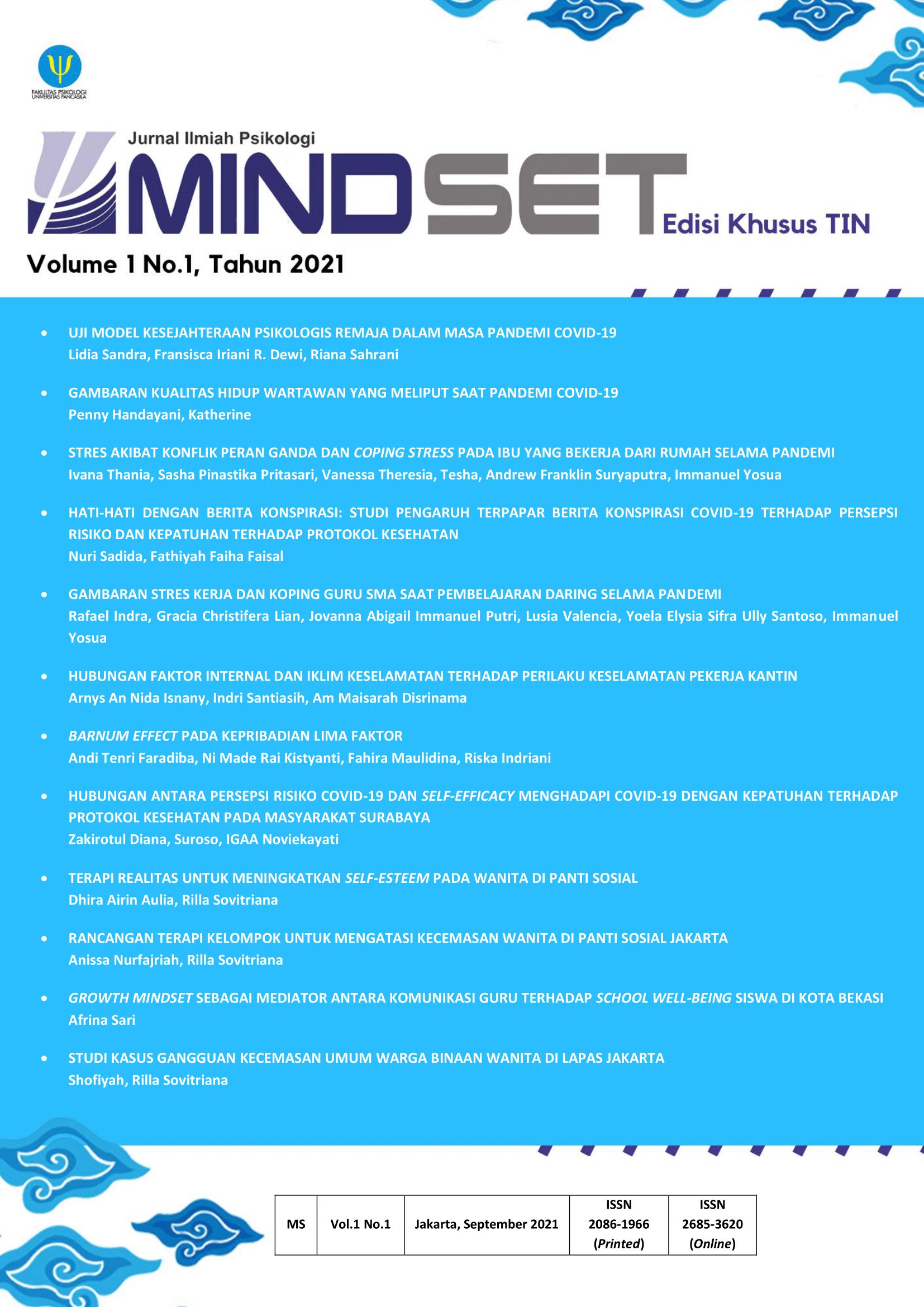Barnum Effect pada Kepribadian Lima Faktor
DOI:
https://doi.org/10.35814/mindset.v1i01.2587Keywords:
barnum effect, psychological test, experimental studyAbstract
The Barnum Effect is the tendency of individuals to accept personality feedback as true information, regardless of its validity. In this case, personality is defined as a relatively settled pattern that individuals have and use to adapt to their environment. The factor approach is used in defining personality which consists of five personality factors, namely openness to experience, conscientiousness, extraversion, agreeableness, and neuroticism. This study aims to test whether there is a Barnum Effect on personality in the adolescent population. The research design used is experimental and the type of research is one group pre-posttest. There were 138 students who were given manipulation in the form of a fake personality test and asked questions about the accuracy of their personality test results. The data in this study indicate that there are differences in personality scores on the factors of neuroticism, openness to experience, and agreeableness before being given personality feedback and after being given feedback. That is, there is a Barnum Effect found in adolescents and personality feedback has an effect on how adolescents perceive their personality.
References
Borghuis, J., Denissen, J. J., Oberski, D., Sijtsma, K., Meeus, W. H., Branje, S., & Bleidorn, W. (2017). Big Five personality stability, change, and codevelopment across adolescence and early adulthood. Journal of Personality and Social Psychology, 113(4), 641.
Febriansyah. (2019, 13 Desember). Daftar website tes kepribadian dan tipe-tipenya. Tirto.id
Cuperman, R., Robinson, R. L., & Ickes, W. (2014). On the malleability of self-image in individuals with a weak sense of self. Self and Identity, 13(1), 1–23. doi:10.1080/15298868.2012.726764
Forer, B. R. (1949). The fallacy of personal validation: A classroom demonstration of gullibility. Journal of Abnormal and Social Psychology. 44(1), 118-123. https://doi.org/10.1037/h005924
Furnham, A., & Schofield, S. (1987). Accepting personality test feedback: A review of the Barnum effect. Current Psychological Research & Reviews, 6 (2), 162–178. doi:10.1007/BF02686623.
McCrae, R. R., & Costa, P. T. (2008). The Five-Factor Theory of Personality. Dalam O. P.John, R. W. Robins, & L. A. Pervins, Handbook of Personality : Theory and Research (hal. 159-181). New York: Guilford Press.
Meehl, P. E. (1956). Wanted—a good cookbook. American Psychologist, 11, 263–272. doi:10.1037/h0044164
Poškus, M. S., & Žukauskienė, R. (2014). Jūsų NEO išvada“ pageidaujamumo bei apibendrintumo suvokimas: rekomendacijos Barnumo efekto tyri- mams [Perception of favoralibily and generalness of the “Your NEO Summary”: reccomendations for Barnum effect studies]. In D. Petkevičiūtė-Barysienė, L. Jovarauskaitė, & P. Želvienė (Eds.), Psichologiniai tyrimai. Reikšmė visuomenei – iššūkis tyrėjui (pp. 23–24). Vilniaus universiteto leidykla. Retrieved from http://www.jmpk.fsf.vu.lt/wp-content/up- loads/2014/04/JMPK-2014-santrauku-leidinys.pdf.
Snyder, C. R., Shenkel, R. J., Lowrey, C. R. (1977). Acceptance of personality interpretations: The "Barnum Effect" and beyond. Journal of Consulting and Clinical Psychology, 46, 104-114.
Tyson, G. (1982a). People who consult astrologers: A profile. Personality and Individual Differences, 13, 119-126












